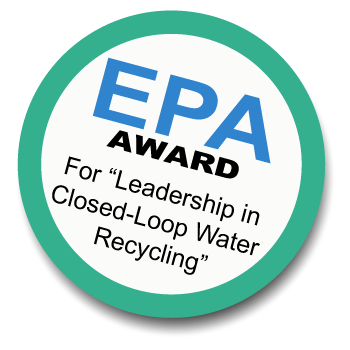Case Study
Temporary Water Soluble Spot Mask
Water Solubility Doesn't Mean Closed-Loop Compatibility
Miamisburg, OH -- Just because a spot mask is water-soluble does not mean it is compatible with closed-loop water recycling equipment. Daytronic Corp. is a supplier of electronic instrumentation and industrial measurement and control equipment in Miamisburg, Ohio. Daytronic produces an average of 300 circuit assemblies per day. Ron Burgin, a process engineer at the facility, explains that when the company switched from CFC-based solvents to pure water cleaning in 1991, they began looking for an alternative to the peelable spot mask that they had been using.
"Daytronic invested in new soldering equipment, a new in-line aqueous cleaner, and a closed-loop recycling system for the cleaning water so that we wouldn't have to put anything down the drain" Burgin explains. "Everything in our process worked fine, except that we needed a replacement for our spot mask. We wanted something water soluble that could be removed in the cleaner, because the old mask had to be stripped by hand. We did not want to have to continue such a labor-intensive process, and wanted to minimize the handling of boards."
However, the engineers at Daytronic had two key concerns with any new mask: First, it had to be thoroughly cleanable in water - that meant no residual ionic contamination or contamination of any kind left on the board. Secondly, it had to be compatible with Daytronic's new ST1030 AquaCycler closed-loop water recycling unit from Separation Technologists, Inc. "Of the different media that the Aquacycler uses to purify our water, the DI beds, - the ion exchange media - is the most expensive to change out" Burgin says. "We wanted to make sure that the mask we chose would have the least effect on ionic loading of the beds."
Samples of water-soluble mask materials were obtained from leading suppliers. Burgin tested several masks offered by major industry suppliers, and discovered that all of them had a high ionic content - an immediate disqualification. There was another problem, too. "We ran several boards one day, and the next morning found that one of the filter cartridges in our recycler had become totally clogged."
"We traced the problem to the spot mask that we had used that day. We discovered that the pumice or filler material in the mask had completely clogged the filter. This masking material proved to be totally unsatisfactory for a recirculating water system."
To make matters worse, Burgin contacted the manufacturers of the spot masks he had been evaluating. "None of them could offer me any alternative, and they were aware of the problem." He and his colleagues at Daytronic were at a virtual dead-end. "Then we found out that Separation Technologists offered a spot mask that would not clog the filters and would also not load up the DI beds. It has a very low ionic content, far lower than any of the others we evaluated. We tried that material and have used it successfully ever since - and that was about four years ago."
John Russo, Separation Technologists' founder and president, explains that SepTech's water soluble spot mask is specially formulated for use in closed-loop water recycling systems. "It washes away with pure water; no saponifier or any other chemistry is needed" he explains. "Our mask doesn't contain the filler used by other masks. Fillers are usually diatomaceous earth material that clogs the tiny pores of the filter cartridges. If the filter cartridges are coarse, they may allow the tiny particles to go through and coat the granular media - activated carbon, ion exchange, and other media. In some cases, the fillers are so fine that they go through the mechanical filter and coat the granular media. Our mask has a very low ionic content, so that more ion exchange resin capacity is available for removal of the ionic contamination from the soldering flux. In cases where a competitive mask has to be used, and higher operating costs are unavoidable, we nonetheless have special media to help reduce those costs. The most economical approach, however, is to use our closed-loop recycler compatible mask."
Another advantage to the material, according to Burgin, is its thinness. "We apply it with a squeeze bottle, and it air dries in just a few minutes. Because it is thinner than other spot masks, we use less - at least one half as much - so our materials cost has gone down, because this mask is priced reasonably close to other masks. The fact that we use less extends the life of the media used to remove it from the water. And it works just as well as any other we've used."
Burgin adds that, overall, his company's decision to convert to fully aqueous cleaning with Separation Technologists' closed-loop recycling has paid off. "We have the process that we want, and we have realized savings in water and energy. Plus, we have got a more efficient process for spot mask removal."
For more information about Separation Technologists' Total Solution to wastewater management for electronics cleaning, contact the company at 7A Raymond Avenue Unit A7 Salem, NH 03079 USA, Tel. (603) 898-0020, Fax (603) 898-4859.
Additional Reference
See the paper presented by Howard Green of Safetran Corporation, NEPCON West Proceedings, 1993. It discusses a method developed by Separation Technologists to reduce the high cost of using a competitor's water soluble mask.

